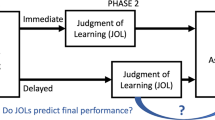Abstract
The development of standardized assessments for competency-to-confess evaluations has remained largely neglected for the last several decades. Groundbreaking research was conducted on Miranda waivers during the late 1970s, but researchers have failed to sustain programmatic research. This critical review focuses on four published Miranda measures (Comprehension of Miranda Rights, Comprehension of Miranda Rights-Recognition, Comprehension of Miranda Vocabulary, and Function of Rights in Interrogation). When evaluated by contemporary standards, the validation of these measures is very limited. Major improvements are needed for interrater reliability, test–retest reliability, content validity, construct validity, and criterion-related validity.
Similar content being viewed by others
References
American Educational Research Association, American Psychological Association, National Council on Measurement in Education (AERA/APA/NCME). (1999). Standards for educational and Ypsychological testing. Washington, DC: American Educational Research Association.
Anastasi, A. (1988). Psychological testing (6th ed.). New York: Macmillan.
Cheney, W. G. (1987). Colorado v. Connelly: Is free will no longer a criteria for the voluntariness of an accused’s waiver and confession under Miranda? Law and Psychology Review, 11, 153–167.
Colorado v. Connelly, 479 U.S. 157 (1986).
Colorado v. Spring, 479 U.S. 564 (1987).
Cooper, V. G., Zapf, P. A., & Griffin, M. P. (2003, August). Appreciation of Miranda rights in interrogation situations. Presented to the American Psychological Association Conference, Toronto, Canada.
Daubert v. Merrell Dow Pharmaceuticals, 113 S.CT. 2786 (1993).
Dickerson v. United States, 166 F.3d 667 (2000).
Ebel, R. (1972). Essentials of educational measurement. Englewood Cliffs, NJ: Prentice-Hall.
Everington, C., & Fulero, S. M. (1999). Competence to confess: Measuring understanding and suggestibility of defendants with mental retardation. Mental Retardation, 37, 212–220.
Frumkin, B. (2000). Competency to waive Miranda rights: Clinical and legal issues. Mental Health and Physical Disability Law Reporter, 24, 326–331.
Fulero, S. M., & Everington, C. (1995). Assessing competency to waive Miranda rights in defendants with mental retardation. Law and Human Behavior, 19, 533–543.
Goldstein, A. M. (2003). Overview of forensic psychology. In A. Goldstein (Ed.), Handbook of psychology: Vol. 11. Forensic psychology (pp. 3–20). New York: Wiley.
Goldstein, N. E., Kalbeitzer, R., Oberlander, L, & Geier, J. (2003, August). Comparison of juveniles’ Miranda rights comprehension: 1970’s versus today. Presented to the American Psychological Association Conference, Toronto, Canada.
Greenfield, D. P., Dougherty, E. J., Jackson, R. M., Podboy, J. W., & Zimmermann, M. L. (2001). Retrospective evaluation of Miranda reading levels and waiver competency. American Journal of Forensic Psychology, 19, 75–86.
Grisso, T. (1981). Juveniles’ waiver of rights: Legal and psychological competence. New York: Plenum.
Grisso, T. (1986). Evaluating competencies: Forensic assessments and instruments. New York: Plenum.
Grisso, T. (1998a). Instruments for assessing understanding and appreciation of Miranda rights. Sarasota, FL: Professional Resource Press.
Grisso, T. (1998b). Juveniles’ waiver of Miranda rights. In T. Grisso, Forensic Evaluation of Juveniles (pp. 37–82). Sarasota, FL: Professional Resource Press.
Grisso, T. (2003). Competence to stand trial. In T. Grisso (Ed.), Evaluating competencies: Forensic assessments and instruments (2nd ed., pp. 69–148). New York: Kluwer Academic.
Gudjonsson, G. H. (2003). The psychology of interrogations and confessions: A handbook. New York: Wiley.
Heilbrun, K., Rogers, R., & Otto, R. K. (2002). Forensic assessment: Current status and future directions. In J. R. P. Ogloff (Ed.), Taking psychology and law into the twenty-first century (pp. 120–146). New York: Kluwer.
Helms, J. L. (2003). Analysis of Miranda reading levels across jurisdictions: Implications for evaluating waiver competency. Journal of Forensic Psychology and Practice, 3, 25–37.
Johnson, M. B., & Torres, L. (1992). Miranda, trial competency and Hispanic immigrant defendants. American Journal of Forensic Psychology, 10, 65–80.
Melton, G. B., Petrila, J., Poythress, N. G., & Slobogin, C. (1997). Psychological evaluations for the courts (2nd ed.). New York: Guilford.
Miller, R. D. (2003). Criminal competence. In R. Rosner (Ed.), Principles and practice of forensic psychiatry (2nd ed., pp. 186–212). London: Arnold.
Miranda v. Arizona, 384 U.S. 436 (1966).
Oberlander, L. B., & Goldstein, N. E. (2001). A review and update on the practice of evaluating Miranda comprehension. Behavioral Sciences and the Law, 19, 453–471.
Oberlander, L. B., Goldstein, N. E., & Goldstein, A. M. (2003). Competence to confess. In A. Goldstein (Ed.), Handbook of psychology: Vol. 11. Forensic psychology (pp. 335–357). New York: Wiley.
People v. Dorado, 62 Cal. 2d 338 (1965).
Psychological Corporation (2002). Wechsler Individual Achievement Test (2nd ed.). San Antonio, TX: Author.
Rogers, R. (2002). Validating retrospective assessments: An overview of research models. In R. I. Simon & D. W. Shuman (Eds.), Predicting the past: The retrospective assessment of mental states in civil and criminal litigation (pp. 287–306). Washington, DC: American Psychiatric Press.
Rosner, R. (Ed.). (2003). Principles and practice of forensic psychiatry (2nd ed.). London: Arnold.
Spitzer, R. L., & Endicott, J. (1978). Schedule of Affective Disorders and Schizophrenia-Change Version. New York: Biometrics Research.
Wall, S. M., & Furlong, M. (1985). Comprehension of Miranda rights by urban adolescents with law-related education. Psychological Reports, 56, 359–372.
Wechsler, D. (1999). Wechsler Abbreviated Scale of Intelligence. San Antonio, TX: Psychological Corporation.
Author information
Authors and Affiliations
Corresponding author
About this article
Cite this article
Rogers, R., Jordan, M.J. & Harrison, K.S. Commentary: A Critical Review of Published Competency-to-Confess Measures. Law Hum Behav 28, 707–718 (2004). https://doi.org/10.1007/s10979-004-0794-z
Issue Date:
DOI: https://doi.org/10.1007/s10979-004-0794-z




